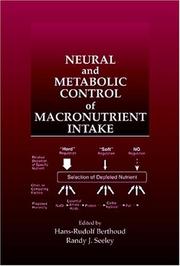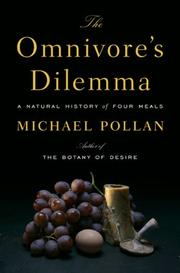| Listing 1 - 10 of 44 | << page >> |
Sort by
|
Book
ISBN: 0081019327 0081019319 9780081019320 9780081019313 Year: 2018 Publisher: Duxford, United Kingdom
Abstract | Keywords | Export | Availability | Bookmark
 Loading...
Loading...Choose an application
- Reference Manager
- EndNote
- RefWorks (Direct export to RefWorks)
Food preferences. --- Food habits --- Nutrition --- Psychological aspects. --- Appetite --- Food preferences --- Food selection --- Taste --- Psychological aspects
Book
ISBN: 1442208759 1299139051 9781442208759 9781299139053 9781442208742 1442208740 9781442232181 1442232188 Year: 2013 Publisher: Lanham Rowman & Littlefield Publishers, Inc.
Abstract | Keywords | Export | Availability | Bookmark
 Loading...
Loading...Choose an application
- Reference Manager
- EndNote
- RefWorks (Direct export to RefWorks)
How America Eats traces American history through its collective stomach, demonstrating that changing ideas about what it means to be American can be seen through food choices and attitudes about eating.
Food habits --- Food preferences --- Food selection --- Nutrition --- Taste --- Psychological aspects --- United States --- Social life and customs.
Book
ISBN: 1280779179 9786613689566 1442213418 9781442213418 9781442213401 9781442213395 144221340X Year: 2012 Publisher: Lanham, Md. Rowman & Littlefield
Abstract | Keywords | Export | Availability | Bookmark
 Loading...
Loading...Choose an application
- Reference Manager
- EndNote
- RefWorks (Direct export to RefWorks)
Presents advice on changing eating habits to promote good health, providing recipes and discussing how to create a balanced diet, plan meals, and use ingredients that are healthy. and also tasty.
Nutrition --- Diet --- Health --- Food preferences --- Food selection --- Food habits --- Taste --- Food --- Psychological aspects

ISBN: 0203688473 128007714X 0203646916 1134490046 9780203646915 9786610077144 6610077142 0415270391 0415270383 9780415270380 9780415270397 9781134490042 9781134489992 1134489994 9781134490035 1134490038 Year: 2004 Publisher: London ; New York : Routledge,
Abstract | Keywords | Export | Availability | Bookmark
 Loading...
Loading...Choose an application
- Reference Manager
- EndNote
- RefWorks (Direct export to RefWorks)
"Food and Cultural Studies re-examines the interdisciplinary history of food studies, from the semiotics of Barthes and the anthropology of Levi-Strauss to Elias's historical analysis and Bourdieu's work on the relationship between food, consumption and cultural identity. The authors then go on to explore subjects as divserse as food and nation, the gendering of eating in, the phenomenon of TV chefs, food-related moral panics and the ethics of vegetarianism."
Food habits. --- Food preferences. --- Food selection --- Eating --- Food customs --- Foodways --- Human beings --- Food habits --- Nutrition --- Taste --- Habit --- Manners and customs --- Diet --- Oral habits --- Psychological aspects --- Food preferences
Book
ISBN: 9780674369696 0674369696 9780674729056 0674729056 067436970X Year: 2014 Publisher: Cambridge, MA
Abstract | Keywords | Export | Availability | Bookmark
 Loading...
Loading...Choose an application
- Reference Manager
- EndNote
- RefWorks (Direct export to RefWorks)
Milk is the only food mammals produce naturally to feed their offspring. The human species is the only one that takes milk from other animals and consumes it beyond weaning age. Cultures of Milk contrasts the practices of the world's two leading milk producers, India and the United States. In both countries, milk is considered to have special qualities. Drawing on ethnographic and scientific studies, popular media, and government reports, Andrea Wiley reveals that the cultural significance of milk goes well beyond its nutritive value. Shifting socioeconomic and political factors influence how people perceive the importance of milk and how much they consume. In India, where milk is out of reach for many, consumption is rising rapidly among the urban middle class. But milk drinking is declining in America, despite the strength of the dairy industry. Milk is bound up in discussions of food scarcity in India and food abundance in the United States. Promotion of milk as a means to enhance child growth boosted consumption in twentieth-century America and is currently doing the same in India, where average height is low. Wiley considers how variation among populations in the ability to digest lactose and ideas about how milk affects digestion influence the type of milk and milk products consumed. In India, most milk comes from buffalo, but cows have sacred status for Hindus. In the United States, cow's milk has long been a privileged food, but is now facing competition from plant-based milk.
Milk --- Dairy products --- Food preferences --- Food selection --- Food habits --- Nutrition --- Taste --- Milk products --- Products, Dairy --- Animal products --- Exocrine glands --- Social aspects --- History. --- Psychological aspects --- Secretions

ISBN: 0849327520 Year: 2000 Publisher: Boca Raton CRC Press
Abstract | Keywords | Export | Availability | Bookmark
 Loading...
Loading...Choose an application
- Reference Manager
- EndNote
- RefWorks (Direct export to RefWorks)
Physiology of nutrition. Metabolism --- Appetite --- Food preferences. --- Dietary Carbohydrates --- Dietary Fats --- Dietary Proteins --- Food selection --- Food preferences --- Neuropsychology --- Nutrition --- Food Preferences --- Hunger --- Neurophysiology --- Psychophysiology --- Food habits --- Taste --- Psychological aspects --- metabolism --- physiology --- psychology

ISBN: 1594200823 9780143038580 Year: 2006 Publisher: London Penguin Books
Abstract | Keywords | Export | Availability | Bookmark
 Loading...
Loading...Choose an application
- Reference Manager
- EndNote
- RefWorks (Direct export to RefWorks)
What should we have for dinner? The question has confronted us since man discovered fire, but according to Michael Pollan, the bestselling author of The Botany of Desire, how we answer it today, at the dawn of the twenty-first century, may well determine our very survival as a species. Should we eat a fast-food hamburger? Something organic? Or perhaps something we hunt, gather, or grow ourselves? The omnivore’s dilemma has returned with a vengeance, as the cornucopia of the modern American supermarket and fast-food outlet confronts us with a bewildering and treacherous food landscape. What’s at stake in our eating choices is not only our own and our children’s health, but the health of the environment that sustains life on earth.In this groundbreaking book, one of America’s most fascinating, original, and elegant writers turns his own omnivorous mind to the seemingly straightforward question of what we should have for dinner. To find out, Pollan follows each of the food chains that sustain us—industrial food, organic or alternative food, and food we forage ourselves—from the source to a final meal, and in the process develops a definitive account of the American way of eating. His absorbing narrative takes us from Iowa cornfields to food-science laboratories, from feedlots and fast-food restaurants to organic farms and hunting grounds, always emphasizing our dynamic coevolutionary relationship with the handful of plant and animal species we depend on. Each time Pollan sits down to a meal, he deploys his unique blend of personal and investigative journalism to trace the origins of everything consumed, revealing what we unwittingly ingest and explaining how our taste for particular foods and flavors reflects our evolutionary inheritance.The surprising answers Pollan offers to the simple question posed by this book have profound political, economic, psychological, and even moral implications for all of us. Beautifully written and thrillingly argued, The Omnivore’s Dilemma promises to change the way we think about the politics and pleasure of eating. For anyone who reads it, dinner will never again look, or taste, quite the same.
Food habits. --- Food preferences. --- GT2850 --- Voeding --- Gezondheid --- Food habits --- Food preferences --- 338.439(100) voedselsituatie --- 641.1/.3 voeding --- Food selection --- Nutrition --- Taste --- Eating --- Food customs --- Foodways --- Human beings --- Habit --- Manners and customs --- Diet --- Oral habits --- Psychological aspects --- Gedrag --- Drank
Book
ISBN: 0716717387 Year: 1986 Publisher: New York (N.Y.): Freeman
Abstract | Keywords | Export | Availability | Bookmark
 Loading...
Loading...Choose an application
- Reference Manager
- EndNote
- RefWorks (Direct export to RefWorks)
Drinking behavior --- Food habits --- Food preferences --- Nutrition --- Food selection --- Psychological aspects --- Affective and dynamic functions --- Nutritionary hygiene. Diet --- Gastronomy --- Movement, Psychology of --- Oral habits --- Senses and sensation --- Appetite --- Taste
Book
ISBN: 0252095367 9780252038099 9780252095368 1306980755 9781306980753 0252038096 Year: 2013 Publisher: Chicago, Illinois
Abstract | Keywords | Export | Availability | Bookmark
 Loading...
Loading...Choose an application
- Reference Manager
- EndNote
- RefWorks (Direct export to RefWorks)
"While eating is a universal experience, for Singaporeans it carries strong everyday and national connotations. The popular Singaporean-English phrase "Die die must try" is not so much hyperbole as it is a reflection of the lengths that Singaporeans will go to find great dishes. In Eating the Nation, Tarulevicz argues that in a society that has undergone substational change in a relatively short amount of time, food serves Singaporeans as a poignant connection to the ever-changing past. Eating, the how and the what, has provided a unifying experience for a diverse society; a metaphor for multiracialism and recognizable national symbols for a fledgling state. Using food as a category of analysis, and analyzing a variety of sources that range from cookbooks to architectural and city plans, Tarulevicz gives the reader a thematic history of this unusual country, which was colonized by the British and run as a port within Malaya, but which is without a substantial pre-colonial history. In doing so, Tarulevicz moves away from the predominately political and economic focus of other historians of Singapore, and provides an important alternative reading of Singaporean society"--
SOCIAL SCIENCE / Agriculture & Food. --- SOCIAL SCIENCE / Anthropology / Cultural. --- HISTORY / Asia / General. --- Food preferences --- Food habits --- Eating --- Food customs --- Foodways --- Human beings --- Habit --- Manners and customs --- Diet --- Nutrition --- Oral habits --- Food selection --- Taste --- Psychological aspects --- Singapore --- Social life and customs.
Book
ISBN: 9780889207813 088920781X Year: 2006 Publisher: Waterloo Wilfrid Laurier University Press
Abstract | Keywords | Export | Availability | Bookmark
 Loading...
Loading...Choose an application
- Reference Manager
- EndNote
- RefWorks (Direct export to RefWorks)
For Canada the last century was one of great social and economic change: an increasingly urban population witnessed shifts from an agricultural to a mixed economy and from moderate to greater wealth. Heick chronicles how changing attitudes toward butter and margarine reflected the nature of that society. He demonstrates how the ban on the manufacture, importation, and sale of margarine was instigated in 1986 at the behest of the nascent, yet influential diary industry, particularly in Ontario. This ban was based on the premise that margarine was not a pure food. Despite the lifting of the
Food preferences --- Protectionism --- Margarine industry --- Butter trade --- Butter industry --- Dairy products industry --- Oil industries --- Free trade and protection --- Commercial policy --- Food selection --- Food habits --- Nutrition --- Taste --- History. --- Government policy --- Psychological aspects --- Consumers --- Urbanization --- Attitudes.
| Listing 1 - 10 of 44 | << page >> |
Sort by
|

 Search
Search Feedback
Feedback About UniCat
About UniCat  Help
Help News
News